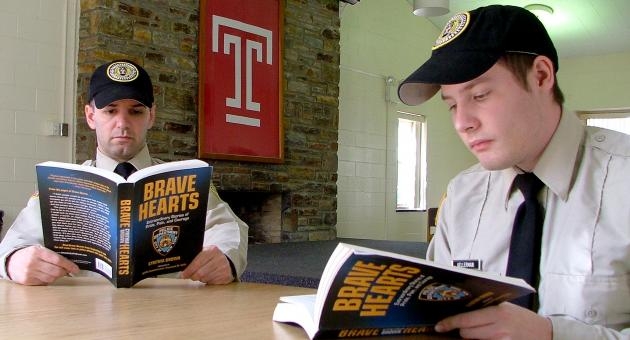Criminal Justice programs teach policing with “Heart”

Cynthia Brown didn’t set out to put the lives and experiences of police officers onto the printed page.
After working in a community policing program in Boston in the 1970’s she felt a “strong obligation” to shine a spotlight on what officers actually go through on the job through their personal stories — the triumphs, tragedies and everything in between.
“When I worked in the station in Boston, I saw more acts of human kindness in some very intense circumstances,” said Brown, who has been working with and advocating for police and law enforcement for more than 30 years and is publisher of American Police Beat magazine. “I don’t think most people have a clue what police officers go through on our behalf to keep us safe.”
With her book Brave Hearts: Extraordinary Stories of Pride, Pain and Courage, Brown sought to “change minds about law enforcement” through the stories of 15 New York City police officers. The stories told are sweeping in scope: from gathering anti-terrorism intelligence, to searching for survivors in the aftermath of 9/11, to tracking a serial killer, toeveryday crime.
Just as Brown didn’t initially set out to change the perception the general public might have of law enforcement, she didn’t initially anticipate the academic applications of her book. Police academies across the country, however, saw its enormous potential to help educate the next generation of law enforcement.
The Temple University Municipal Police Academy, offered at Temple University Ambler, is one of the first to incorporate Brave Hearts into its curriculum. The Philadelphia Police Department and Indiana Law Enforcement Academy are also using the book in the classroom, and other academies will soon follow.
“Brave Hearts is a compendium of incidents from officers in the field that faithfully and accurately describes so many different types of the work that police officers do,” said Temple University Municipal Police Academy Director Robert Deegan. “These are stories of successful officers with a strong work ethic and the courage to risk their own physical and mental health to protect and serve.
“It talks about the stress that officers are involved in, the frustrating nature of criminal investigation, the endless paperwork, dealing with people at their worst, but it also talks about the rewards — doing your work well and positively impacting people and communities.”
As an unvarnished look at the lives of police officers, Deegan said Brave Hearts is an excellent tool to help academy cadets think about and reflect on the law enforcement profession.”
“It’s one thing for an instructor to talk about what they are getting into. It’s another to see it in print, to read about the experiences of officers in the field,” he said. “Each cadet receives a copy of the book and they are asked to prepare a report based on their findings and interpretations. Each chapter opens up a dialogue and encourages discussion. It provides insight into the culture of law enforcement through detailed and thought-provoking questions.”
Deegan said Brave Hearts helps the academy develop cadets who are “graduating with a better understanding of the career they are entering into.”
“The more you know about what you are getting involved in, the more prepared you are to deal with the problems and the stresses, the better the officer,” he said.